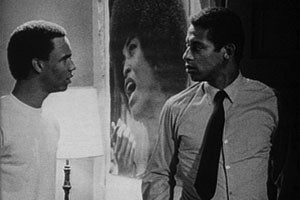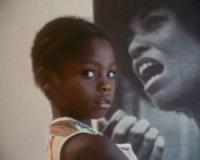Fragrance writer, director Gay Abel-Bey’s MFA thesis project at UCLA is a touching film with a strong classic, old Hollywood veneer that makes witnessing crisis points in the film’s family easier to watch. The debate over who should fight in a war and for what purpose is superb fodder for a film’s story. War brings out the best and worst in people, and Abel-Bey masterfully navigates the emotional territory on my levels. In the opening scenes, the youngest of three siblings, Bobby, still in grade school, is punished by singing "America, My Country ’Tis of Thee" solo in front of his class. The smooth integration of this song presented by young people who are still unaware of what the very song means, is a powerful tool that sets up the central question of the film; what is the difference between freedom and cowardice?
The sense of family is created swiftly and powerfully when the oldest son, George, dressed in an Army Class A uniform, surprises his little brother, Bobby. They embrace and roughhouse while their mother watches on proudly and joyfully. The middle-class suburban family, with a mother and a father, is fully integrated into a conservative, follow-the-rules world, with only the middle son questioning authority.

Little is said about the politics of Vietnam or explicit racial politics, yet the little that is said, and that is left unsaid, is much more powerful than a verbal beating a lesser controlled filmmaker might have used to make the point. Abel-Bey exhibits great control of dialogue, direction and cinematography to tell her story smoothly, and with great force. The film does not question whether Vietnam is a Black or white man’s war, instead, the film raises the question for all men.
There is a touching scene between George and his father who sit together in the dark after a farewell party for George. The father wears his old uniform, proud of his service time, while George has begun to question the war. His father reassures him in a soft, quiet tone, “Remember this, George, if you remember anything at all. They are the enemy because their eyes are no different from yours.” George then admits to his father that he is afraid and, after what seems like the longest pause in cinema, his father lights his pipe, never responding until George pushes him for a response. “What do you want me to say? That it’s alright. I can’t because there’s no place in this world for scared folk. It’ll eat you alive.” The father starts to exit but turns around and steps closer to George and practically whispers to him, “Georgie, son, we’re all afraid of something. There’s a difference between being afraid and being a coward.” The music track recalls Jimi Hendrix’s "Star Spangled Banner," electric and alive.
By the end of the film, George has passed a small African Unity flag to Bobby, in effect telling him to remember why. The final scene of the film reflects the opening, but this time Bobby does not sing. He looks past his classmates, silent, almost angry.
—Dawn Spinella






 Mobile Navigation
Mobile Navigation

